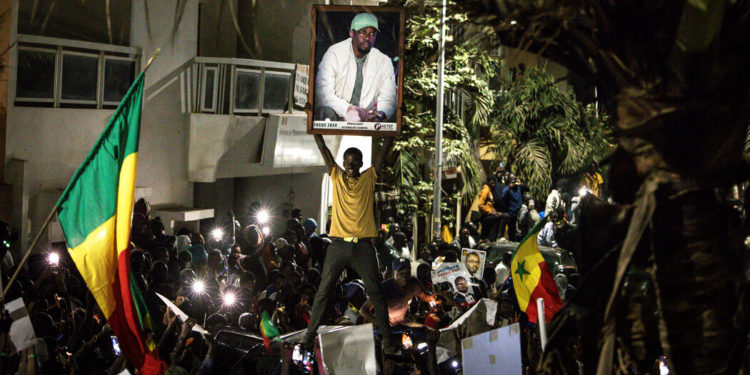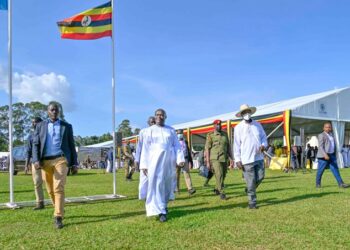By THE NEW YORK TIMES
Two opposition party politicians were released from jail in Senegal on Thursday night, just 10 days before a nationwide election in which one of them is running for president.
Hundreds of supporters celebrated in the streets of Dakar after Ousmane Sonko, Senegal’s foremost opposition leader, was freed along with Bassirou Diomaye Faye, his party’s candidate in the election on March 24.
“You never gave up even when we were absent. You kept on fighting.” Mr. Faye told supporters in Dakar on Thursday evening. “Today we are ready to join you in the same fight.”
The release is the latest in a series of unexpected moves by the incumbent president, Macky Sall, who cited allegations of corruption when he announced last month that he was canceling the election. Facing a backlash, he reversed course and set the election for Sunday, March 24 — just nine days before his term ends.
After years of hinting that he might run again, Mr. Sall finally confirmed last July that he would step down after his two terms were up.
Senegal, a coastal West African nation of 17 million people, is seen as a bastion of democracy relative to some of its West African neighbors, which are ruled by military juntas following a spate of coups in recent years.
Mr. Sonko was ineligible to run in the upcoming election because he was convicted last June of corrupting a minor and sentenced to two years in prison. Mr. Faye was running from jail, where he was awaiting trial on defamation charges and contempt of court, after he accused magistrates of persecuting Mr. Sonko to serve Mr. Sall’s interests in a social media post last year.
Campaigning has started ahead of the election. Mr. Sall’s chosen successor, the former prime minister Amadou Ba, has held rallies that have been poorly attended and have garnered little attention.
Alioune Tine, an expert on human rights in West Africa, said that the imprisonment of Mr. Sonko and Mr. Faye had increased their cachet, especially for Mr. Faye who was a little known figure before he was named as Mr. Sonko’s replacement for the election.
“When you throw leaders in jail, you turn them into heroes,” said Mr. Tine, the founder of the AfrikaJom Center, a Dakar-based research organization.
As Mr. Sonko and Mr. Faye paraded in Dakar’s downtown on Thursday evening, it was Mr. Sonko’s name that supporters chanted. But Mr. Sonko kept a low profile while Mr. Faye addressed the crowds with a microphone, standing in a car, a scarf in the colors of the Senegalese flag around his neck.
“Sonko will play a central role in the campaign, but the key challenge for him will be not to overshadow Faye too much, so Faye can win,” Mr. Tine added.
Mr. Sonko seemed intent on staying in the background on Friday. Briefing reporters, Mr. Sonko said that the government had spoken to him about postponing the election again so that he could run. But, Mr. Sonko said, he was happy for Mr. Faye to be the candidate.
“It’s not about me, it’s about the party,” he said. “Diomaye Faye has never made a decision without asking me.”
Nineteen candidates in all are on the ballot for the election in Senegal, one of the few countries in the region that has never endured military rule. In recent years, however, Mr. Sall’s government had repeatedly cut off access to the internet and forbidden demonstrations as Mr. Sonko rose to fame.
Dozens of protesters have been killed during anti-government riots, many by live ammunition that human rights groups said was fired by the country’s security forces.
Mr. Sonko is a charismatic yet divisive figure, who was tried on charges of raping an employee of a massage parlor. He was acquitted of rape, but sentenced last year to two years in prison for “corruption of youth” because the employee was under 21.
Mr. Sall signed an amnesty law earlier this month, which eventually led to the release of Mr. Faye and Mr. Sonko. But Mr. Sonko’s role in both the upcoming election and the country’s political future remains unclear.
A former tax inspector and currently the mayor of the southern town of Ziguinchor, Mr. Sonko has vowed to rid Senegal of corruption, appealing to young Senegalese voters — though he has not made clear how he plans to execute his promises of sweeping change.
“Sonko is the person Senegal needs,” said Serge Goudiaby Atepa, a well-known Senegalese architect and the head of Senegal’s main lobby of business leaders.
Mr. Atepa also praised Mr. Sall for releasing Mr. Sonko, who for years was his main political foe. “The crowds we saw on the streets last night prove that it was the right thing to do.”







Discussion about this post